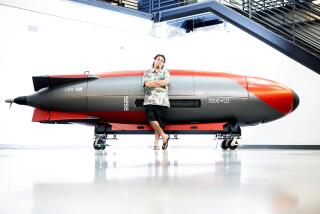Israel grimaces at a leading export: Innovation

HERZLIYA, Israel — High-tech entrepreneur Kobi Stok is chasing the new Israeli dream.
The 33-year-old software engineer quit a steady job to launch a Web start-up that teaches guitar playing. In three years, Stok’s Jamstar.co signed up 80,000 users, raised $650,000 from investors, and inked a partnership deal with Warner Music to teach songs by Led Zeppelin and others on the site.
Next step? Like most Israeli start-up founders, Stok is hoping to sell his brainchild to a large international Internet-based company, preferably at a price in the eight digits.
“I’m not doing this for the money, but of course I want an exit,” Stok said, adding that he’s already working on ideas for his next venture.
Fueled by such entrepreneurs, technology start-ups have become one of Israel’s fastest-growing exports. But beneath the high-profile buyouts, concern is mounting that Israelis are focusing too heavily on selling their innovations to outsiders rather than building large Israeli-based corporations that could provide a sustained contribution to the small nation’s economy.
Once acquired by foreign buyers, more than half the Israeli start-ups are shuttered, according a study by the Israel Export Institute. The rest usually become research units of the new parent company.
Few question that Israeli ingenuity has made the country’s technology industry one of the world’s hottest. Attracted by inventions such as instant messaging and USB flash drives, about 250 international technology companies, including Intel, Cisco, Hewlett-Packard, Microsoft, Apple and Google, have set up research units here to take advantage of the local talent and snap up promising technologies before the competition does.
Over the last five years, nearly 300 Israeli start-ups have sold for a total of $17 billion, according to the Israeli trade group Israel Advanced Technology Industries. U.S.-based firms have been among the most aggressive, including Cisco, with its $475-million purchase of network software maker Intucell, and Apple, which in 2011 acquired flash-storage firm Anobit, reportedly for as much as $500 million.
Facebook is looking to buy the Israeli navigation app Waze for nearly $1 billion, according to Israeli media reports.
It’s a whopping payday for a select group of entrepreneurs. But many in Israel are asking what the country is getting out of these deals. Where is the Israeli Nokia or Google? they ask.
“The idea of a start-up nation is very flattering to Israel, but there’s another side to the coin,” said Giora Shalgi, former chief executive of Rafael Advanced Defense Systems, one of Israel’s largest defense contractors. He is urging the government to do more to help shepherd start-ups through the difficult early years into “industrial maturity.”
“With premature exits, a few guys make millions, but nothing is left in the country,” said Shalgi, who went on to compare start-ups to saplings. “We need people to plant trees here that will grow with all its branches. Instead they are being uprooted to grow in someone else’s garden.”
By remaining independent and Israeli-based, many of these firms would pay more in corporate income taxes, hire more workers and contribute more to the nation’s economy, experts say.
“Israelis are providing the innovation and then someone else is making the money,” said economics writer David Rosenberg of Haaretz newspaper. “We need to figure out how to retain more of that money for ourselves.”
But few Israeli technology entrepreneurs today dream about building and running large corporations. The same culture of energy and creativity that spurs Israeli innovators to think outside the box, solve problems and challenge authority also leads to impatience and boredom when it comes to the less glamorous work of running large companies, boosting sales or fine-tuning production.
Rosenberg points to companies like high-flying electric car maker Better Place. The venture raised at least $800 million with its promise to revolutionize the auto industry, but it filed for bankruptcy liquidation Sunday after failing to develop a car that Israelis wanted to buy.
Few fault Israel’s entrepreneurs, who are usually in their 20s and 30s, for succumbing to the temptation of big payouts.
“They want to change the world, but then let someone else take it to the next level and don’t stay long enough to see the world change,” said Tzahi Weisfeld, strategy director of Microsoft’s research and development center in Herzliya. “People get bored easily. Maybe it’s a maturity thing. Like teenagers, they play with a game and think it’s the best, but then want to play with the next one.”
With 600 employees in Israel, Microsoft has acquired seven Israeli firms and helps foster start-ups through a program that offers mentoring, office space, logistical support and free software.
Even though it might increase competition, Weisfeld said, Microsoft would welcome the emergence of a few large Israeli-based technology firms. “It would be good for Israel’s [technological] ecosystem to have a few anchor companies.”
Yet even if founders’ attitudes change, building such giants may be difficult in Israel because of the country’s small size and regional isolation, said Tamar Almor, business professor at the College of Management Academic Studies in Rishon LeZion.
“Israel is so small that we have very few potential clients, so start-ups are born global and have to sell internationally from Day 1,” she said. Such global aspirations require significant resources in language, product support and government regulation that start-up entrepreneurs cannot handle on their own, she said. Many who try to go it alone end up failing and regretting they didn’t sell when they had the chance.
One of the few technology start-ups to turn into a large Israeli-based firm is Check Point, a leading network security provider with more than $1 billion in annual sales and 2,700 employees.
Mati Ram, head of Check Point’s risk management and compliance, said the firm was fortunate to emerge in the 1990s, when competition wasn’t as tough from rival markets such as India and there weren’t as many Israeli start-ups.
“Since 2000 I can’t think of one Israel company established that has managed to grow to $1 billion in sales,” said Ram, whose own small firm was acquired by Check Point in 2011.
“It is relatively easy to raise funding for a start-up,” he said. “However, raising money for a company that wants to grow and become a multinational company, like Check Point, for example, is more complicated.”
Some worry that foreign investment has grown too large. Already foreign venture capital funds have replaced Israelis as the biggest funders of start-ups. Nearly half the nation’s workers in research and development are employed by multinationals, industry experts estimate.
Intel alone, with more than 8,000 workers in Israel, accounts for 10% of the nation’s total exports, the company estimates.
Microsoft’s Weisfeld says foreign companies that purchase Israeli start-ups and set up local offices are major contributors to the economy in terms of employment and good corporate citizenship. In addition to its program for nurturing start-ups, Microsoft works to promote public education, women in technology and numerous charities, he said.
Ramzi Gabbay, chairman of the Israel Export and International Cooperation Institute, acknowledged that multinational companies have proved crucial players in developing Israel’s high-tech sector, but he said the long-term goal should focus on keeping local companies from selling out.
“On the national level, it is ultimately damaging,” he said of the exit culture. “We’d also like to see an Israeli Intel develop. The multinational companies that operate in Israel with R&D; centers are important employers. But they could decide to leave tomorrow.”
News assistant Batsheva Sobelman in The Times’ Jerusalem bureau contributed to this report.
More to Read
Sign up for Essential California
The most important California stories and recommendations in your inbox every morning.
You may occasionally receive promotional content from the Los Angeles Times.










